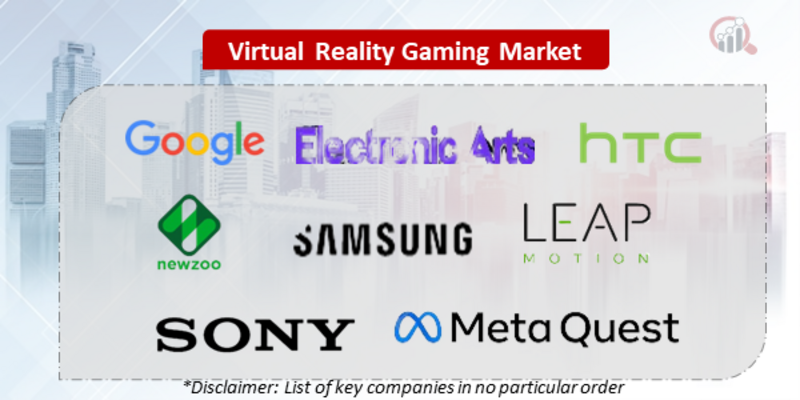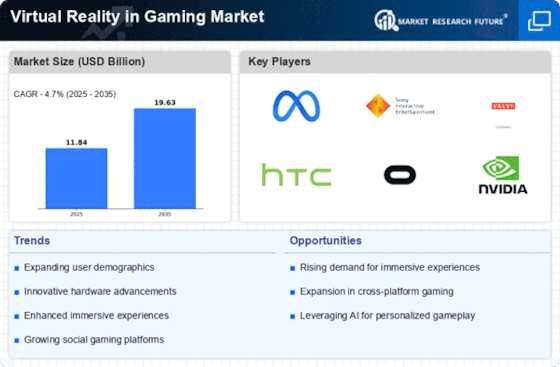Top Industry Leaders in the Virtual Reality Gaming Market

Competitive Landscape of Virtual Reality Gaming Market
The virtual reality (VR) gaming industry is on a thrilling ascent, propelling players into immersive worlds overflowing with possibilities. This vibrant ecosystem is brimming with competition, strategic maneuvering, and a constant influx of innovation. To navigate this complex landscape, let's delve into the key factors influencing market share, explore the strategies adopted by top players, and discover the rising stars shaping the future of VR gaming.
Some of the Virtual Reality Gaming companies listed below:
- Electronic Arts Inc
- HTC Corporation
- Newzoo
- SAMSUNG
- Kaneva
- LEAP MOTION INC.
- Sony Corporation
- Oculus VR LLC
- VirZOOM Inc
- ZEISS International
Strategies Adopted by Key Players:
- Platform Expansion and Innovation: Constantly improving existing platforms (Meta Quest 2) and developing advanced headsets like Project Cambria showcase Meta's commitment to innovation.
- Content Acquisition and Partnerships: Sony's acquisition of VR studio Firesprite and Meta's purchase of Camouflaj demonstrate the importance of securing exclusive content for platform differentiation.
- Focus on Accessibility and Inclusiveness: Lowering price points, developing accessible VR experiences, and expanding hardware compatibility (Valve Index) broaden the VR gaming audience.
- Partnerships and Collaborations: Collaborating with game developers, esports leagues, and virtual reality platforms like SteamVR opens new avenues for growth and reach.
Factors for Market Share Analysis:
- Hardware Platforms: Companies compete for dominance with their distinct hardware offerings, targeting different price points and user preferences.
- Content Ecosystem: A robust library of compelling VR games is crucial. Studios Interactive Entertainment, and independent developers battle for attention with diverse titles spanning genres.
- Accessibility and User Experience: Streamlined setup, intuitive controls, and comfortable hardware design are paramount for attracting new players and ensuring user retention.
- Regional Focus: Understanding regional preferences and regulations plays a crucial role. Companies to the Chinese market, while Meta and Sony target global audiences.
New and Emerging Companies:
- Pimax: This company pushes the boundaries of VR technology with its high-resolution headsets like the Pimax Vision Pro, catering to enthusiasts and professional VR users. (Image of Pimax Vision Pro VR Headset)
- Focus Games: This independent studio is known for its innovative VR titles like Arizona Sunshine and Lies Beneath, contributing to the diversification of VR game experiences. (Image of Arizona Sunshine VR Game)
- Bytedance (Pico Interactive): This Chinese company's Pico Neo 3 Pro headset is gaining traction in the Asian market with its competitive price point and focus on social VR experiences. (Image of Pico Neo 3 Pro VR Headset)
Latest Company Updates:
Meta (formerly Oculus):
December 15, 2023- The leading VR company continues to invest heavily in its Quest platform, with new titles, social VR experiences, and fitness apps bolstering its ecosystem. The recent acquisition of VR studio Camouflaj is another sign of Meta's commitment to exclusive content.
Sony:
December 20, 2023- PlayStation VR2 launch is expected to boost Sony's presence in the VR market, leveraging its strong console base and established gaming franchises. Exclusive titles like Horizon Call of the Mountain and Ghostwire: Tokyo are generating excitement.









